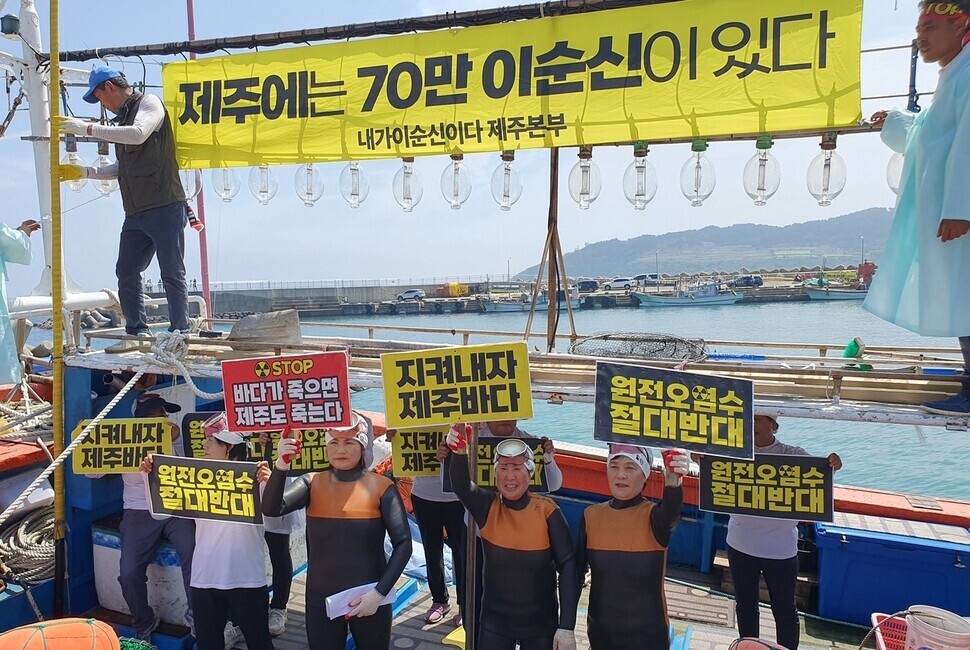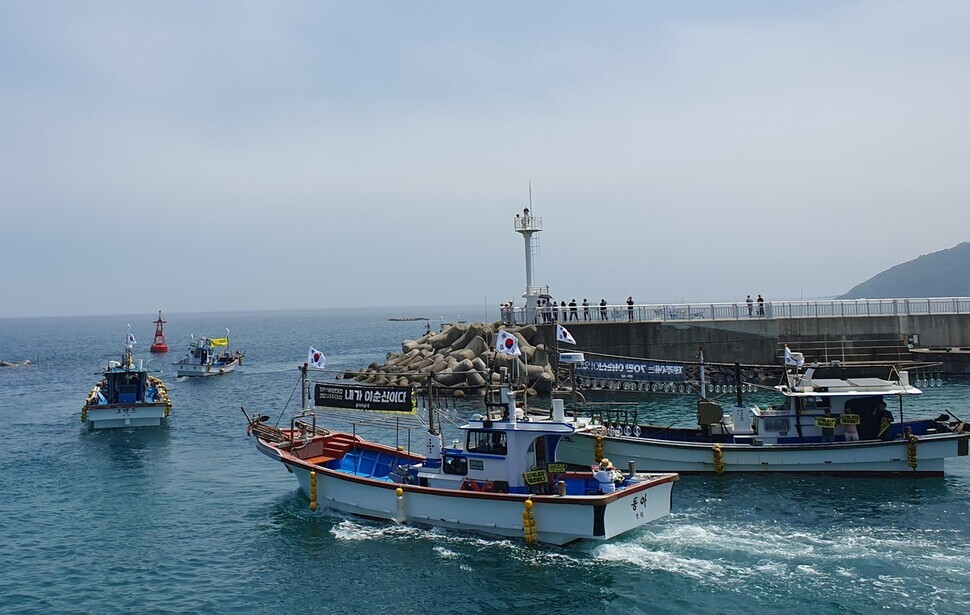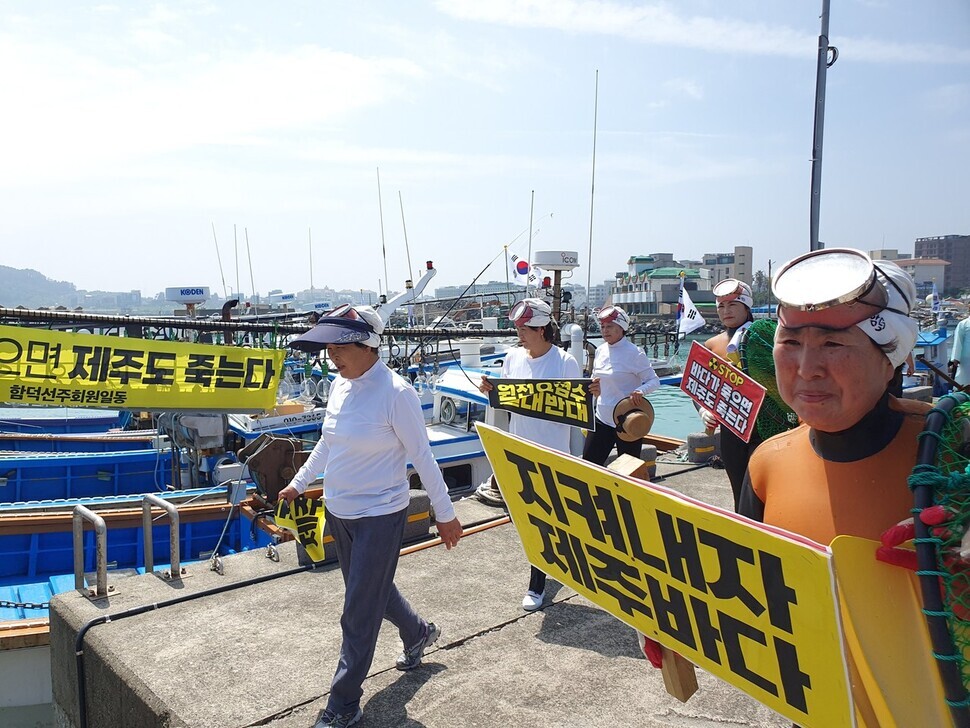hankyoreh
Links to other country sites 다른 나라 사이트 링크
“If the sea dies, so does Jeju”: Jeju women divers, fishers protest Fukushima water dumping

“The Jeju sea grounded my life and acted as a mother to me. The sea has swallowed so many tears that I shed in the shadows. It is the best friend that has kept me alive, and the mother that has fully accepted me.”
On Thursday, Jeong Mi-ran, the president of the association of Jeju’s haenyeo women divers took the microphone and reminisced about when, as a child, she learned how to dive with tears in her eyes while her friends went to school.
The atmosphere became somber. In a desperate voice, Jeong begged that Japan’s discharge of radioactive contaminated water be stopped.
Earlier in the day, a maritime protest was held off the coast of Jeongju Port in Hamdeok, on the island’s northwestern edge, against the discharge of contaminated water from Japan’s Fukushima nuclear power plant.
The protest was attended by all 16 haenyeo from the Hamdeok fishing village to which Jeong belongs. They said that all news related to the contaminated water upset and angered them.
“The sea is older than all of us,” said Kim Gon-sun, 71, surrounded by her fellow haenyo. “It’s a completely different sea from what it was 10 years ago. Knowing that, it’s impossible to not worry about the sea after hearing about the discharge of contaminated water. How are we supposed to go on and live?”
The haenyeo held up signs that read, “Let’s protect the Jeju sea.”

About 50 people from Hamdeok’s fishing community, haenyeo association, shipowners association, Jeju Dadam, and an association of Jeju youth participated in the protest.
“It’s not just our generation, but our descendants who have to rely on the sea for their livelihoods,” the groups said in a statement. “If the Fukushima radioactive contaminated water is actually discharged, it will endanger all forms of life on Jeju, surrounded by water on all sides, including humans.”
After reading the statement, the haenyeo and fishers boarded 12 fishing boats and held a maritime protest with a banner that read, “If the sea dies, so does Jeju.”
The Hamdeok haenyeo and fishermen’s maritime protest is the second following a maritime protest by haenyeo and fishermen from Dodudong fishing village in Jeju City in May 2023.
By Heo Ho-Joon, Jeju correspondent

Please direct questions or comments to [english@hani.co.kr]

Editorial・opinion
![[Column] Life on our Trisolaris [Column] Life on our Trisolaris](https://flexible.img.hani.co.kr/flexible/normal/500/300/imgdb/original/2024/0505/4817148682278544.jpg) [Column] Life on our Trisolaris
[Column] Life on our Trisolaris![[Editorial] Penalties for airing allegations against Korea’s first lady endanger free press [Editorial] Penalties for airing allegations against Korea’s first lady endanger free press](https://flexible.img.hani.co.kr/flexible/normal/500/300/imgdb/original/2024/0502/1817146398095106.jpg) [Editorial] Penalties for airing allegations against Korea’s first lady endanger free press
[Editorial] Penalties for airing allegations against Korea’s first lady endanger free press- [Editorial] Yoon must halt procurement of SM-3 interceptor missiles
- [Guest essay] Maybe Korea’s rapid population decline is an opportunity, not a crisis
- [Column] Can Yoon steer diplomacy with Russia, China back on track?
- [Column] Season 2 of special prosecutor probe may be coming to Korea soon
- [Column] Park Geun-hye déjà vu in Yoon Suk-yeol
- [Editorial] New weight of N. Korea’s nuclear threats makes dialogue all the more urgent
- [Guest essay] The real reason Korea’s new right wants to dub Rhee a founding father
- [Column] ‘Choson’: Is it time we start referring to N. Korea in its own terms?
Most viewed articles
- 1New sex-ed guidelines forbid teaching about homosexuality
- 260% of young Koreans see no need to have kids after marriage
- 3OECD upgrades Korea’s growth forecast from 2.2% to 2.6%
- 4[Column] Life on our Trisolaris
- 5[Guest essay] Maybe Korea’s rapid population decline is an opportunity, not a crisis
- 6Presidential office warns of veto in response to opposition passing special counsel probe act
- 7S. Korea discusses participation in defense development with AUKUS alliance
- 8Two lung cancer deaths at Samsung Electronics deemed occupational in nature
- 9Trump asks why US would defend Korea, hints at hiking Seoul’s defense cost burden
- 10Inside the law for a special counsel probe over a Korean Marine’s death